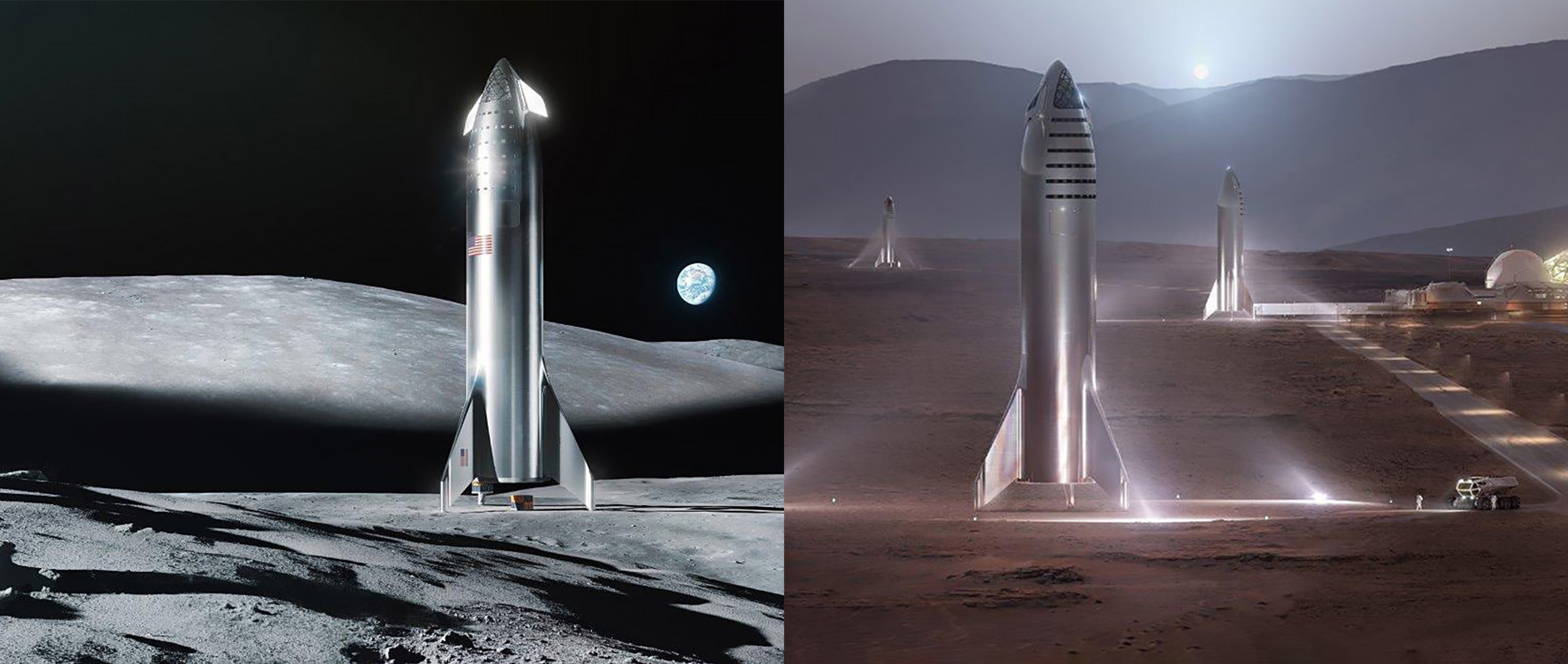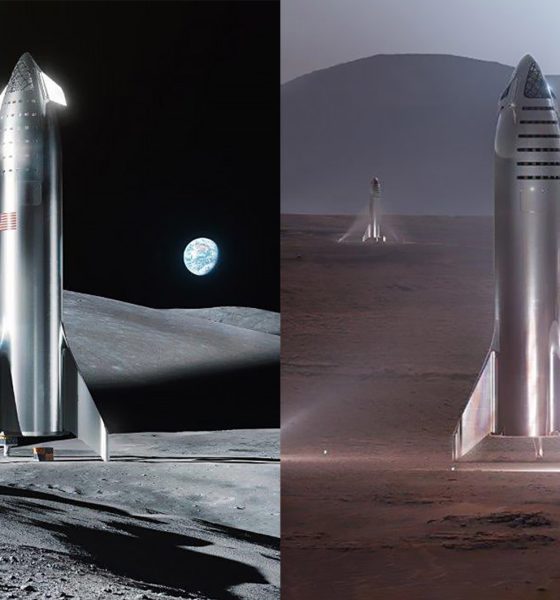

News
SpaceX CEO Elon Musk teases steel Starship on the Moon and Mars
SpaceX CEO Elon Musk has published the first official renders of the company’s updated stainless steel Starship, offering glimpses of the spacecraft on both the Moon and Mars.
Although the designs of Starship and Super Heavy (formerly BFS and BFR) have shifted significantly over the past three years, the vehicle’s primary destinations have remained stable. Above all else, SpaceX remains focused on designing its next-gen rocket to be the best spacecraft ever built for transporting huge payloads and humans to the Moon, Mars, and ultimately throughout the solar system. The interplanetary future of Starship is currently an unknown quantity but SpaceX is already building the first full-scale orbital prototype and testing multiple finished versions of the Raptor engine that will power it.
As discussed earlier today, SpaceX has already completed a low-fidelity prototype of Starship known as Starhopper, designed to – per its namesake – perform low-altitude, low-velocity hop tests. Powered by Raptor, Starhopper also acts as a mobile test stand for the next-gen rocket engine meant to power both Starship and its Super Heavy booster. SpaceX’s current planning has delayed a vacuum variant of the engine for several years, instead choosing to standardize the same Raptor engine across both stages of BFR. Starship will feature seven Raptor engines producing ~14,000 kN (~3.2M lbf) of thrust, while Super Heavy’s latest iteration would require a 31 Raptors and produce a staggering 62,000 kN/14M lbf of thrust at liftoff.
That performance – theoretically making Starship/Super Heavy almost two times as powerful as Saturn V – is essential to support massive missions to Mars and the Moon while also enabling complete reusability of the rocket. SpaceX rightly judged that rapid, low-effort reusability is the only way to truly revolutionize the cost of access to orbit, at least for the indefinite future. This need itself piggybacks on CEO Elon Musk’s founding motivation: to make humanity a multi-planetary species and protect it against future mass-extinction events.
Musk has long viewed the Moon as a distraction to that goal, offering very little prospect of being more than a detour, but both NASA and the political apparatus currently controlling the US have decided that a rebranded Moon return is desirable. Repeating several nearly identical Moon return proposals from the last few decades, the political powers that be have yet to actually put any money where their mouths are. SpaceX and Musk have nonetheless jumped on the bandwagon, a pragmatic decision to hedge bets in case funding actually appears. Unsurprisingly, SpaceX is interested in any opportunity to acquire federal funding for its expensive Starship/Super Heavy/Raptor development programs.
In September 2018, SpaceX announced plans to send Japanese billionaire Yusaku Maezawa and 8-10 artists of his choice on the first Starship mission around the Moon. According to Musk, that could happen as early as 2023 but will necessarily be preceded by at least one uncrewed demonstration of Starship’s performance in deep space. Given the nominal reusability of Starship, the same spacecraft might perform both missions.
In the meantime, SpaceX is in the process of building the first orbital Starship prototype, although it’s unclear just how advanced the vehicle will be. Depending on how polished and successful SpaceX’s Starship Alpha (for lack of a better term) is, it’s conceivable that the spacecraft could be retrofitted or upgraded for actual demonstration missions to deep space or the Moon. To enable the long-term reusability of Starships, SpaceX will need to rely on in-orbit refueling by way of dedicated tanker launches. However, a lower-fidelity prototype that might otherwise be scrapped could be a prime candidate for a one-way Moon-impact or lunar-landing mission, reducing risk for future crewed or uncrewed Starship missions to the Moon before SpaceX has the facilities and hardware to support simultaneous Starship and tanker launches.
Check out Teslarati’s Marketplace! We offer Tesla accessories, including for the Tesla Cybertruck and Tesla Model 3.

News
Tesla ships out update that brings massive change to two big features
“This change only updates the name of certain features and text in your vehicle,” the company wrote in Release Notes for the update, “and does not change the way your features behave.”

Tesla has shipped out an update for its vehicles that was caused specifically by a California lawsuit that threatened the company’s ability to sell cars because of how it named its driver assistance suite.
Tesla shipped out Software Update 2026.2.9 starting last week; we received it already, and it only brings a few minor changes, mostly related to how things are referenced.
“This change only updates the name of certain features and text in your vehicle,” the company wrote in Release Notes for the update, “and does not change the way your features behave.”
The following changes came to Tesla vehicles in the update:
- Navigate on Autopilot has now been renamed to Navigate on Autosteer
- FSD Computer has been renamed to AI Computer
Tesla faced a 30-day sales suspension in California after the state’s Department of Motor Vehicles stated the company had to come into compliance regarding the marketing of its automated driving features.
The agency confirmed on February 18 that it had taken a “corrective action” to resolve the issue. That corrective action was renaming certain parts of its ADAS.
Tesla discontinued its standalone Autopilot offering in January and ramped up the marketing of Full Self-Driving Supervised. Tesla had said on X that the issue with naming “was a ‘consumer protection’ order about the use of the term ‘Autopilot’ in a case where not one single customer came forward to say there’s a problem.”
This was a “consumer protection” order about the use of the term “Autopilot” in a case where not one single customer came forward to say there’s a problem.
Sales in California will continue uninterrupted.
— Tesla North America (@tesla_na) December 17, 2025
It is now compliant with the wishes of the California DMV, and we’re all dealing with it now.
This was the first primary dispute over the terminology of Full Self-Driving, but it has undergone some scrutiny at the federal level, as some government officials have claimed the suite has “deceptive” names. Previous Transportation Secretary Pete Buttigieg was one of those federal-level employees who had an issue with the names “Autopilot” and “Full Self-Driving.”
Tesla sued the California DMV over the ruling last week.
News
Tesla workers push back against Giga Berlin unionization
“IG Metall did not succeed in Giga Berlin‘s works council election earlier today. The union share was reduced from nearly 40% in 2024 to 31% in 2026! This is a clear message by the Giga Berlin team towards an independent co-determination! The list called Giga United, led by the current chairwoman, Michaela Schmitz, received the most votes with more than 40%! Good news for Giga Berlin!”

Tesla workers pushed back against unionization efforts at Gigafactory Berlin, and over the past few years, there has been a dramatic decrease in interest to unionize at the German plant.
Gigafactory Berlin Plant Manager André Thierig announced on Wednesday that IG Metall, the European union group, saw its share reduce from 40 to 31 percent in 2026 as employees eligible to vote on the issue. Instead, the Giga Berlin team, known as Giga United, received the most votes with more than 40 percent.
BREAKING! 🚨
IG Metall did not succeed in Giga Berlin‘s works council election earlier today. The union share was reduced from nearly 40% in 2024 to 31% in 2026!
This is a clear message by theGiga Berlin team towards an independent co-determination!
The list called Giga…
— André Thierig (@AndrThie) March 4, 2026
Thierig gave specific details in a post on X:
“IG Metall did not succeed in Giga Berlin‘s works council election earlier today. The union share was reduced from nearly 40% in 2024 to 31% in 2026! This is a clear message by the Giga Berlin team towards an independent co-determination! The list called Giga United, led by the current chairwoman, Michaela Schmitz, received the most votes with more than 40%! Good news for Giga Berlin!”
There were over 10,700 total employees who were eligible to vote, with 87 percent of them turning out to cast what they wanted. There were three key outcomes: Giga United, IG Metall, and other notable groups, with the most popular being the Polish Initiative.
The 37-seat council remains dominated by non-unionized representatives, preserving Giga Berlin as Germany’s only major auto plant without a collective bargaining agreement.
Thierig and Tesla framed the outcome as employee support for an “independent, flexible, and unbureaucratic” future, enabling acceleration on projects like potential expansions or new models. IG Metall expressed disappointment, accusing management of intimidation tactics and an “unfair” campaign.
The first election of this nature happened back in 2022. In 2024, IG Metall emerged as the largest single faction with 39.4 percent, but non-union lists coalesced for a majority.
But this year was different. There was some extra tension at Giga Berlin this year, as just two weeks ago, an IG Metall rep was accused by Tesla of secretly recording a council meeting. The group countersued for defamation.
Tesla Giga Berlin plant manager faces defamation probe after IG Metall union complaint
This result from the 2026 vote reinforced Tesla’s model of direct employee-management alignment over traditional German union structures, amid ongoing debates about working conditions. IG Metall views it as a setback but continues advocacy. Tesla sees it as validation of its approach in a competitive EV market.
This outcome may influence future labor dynamics at Giga Berlin, including any revival of expansion plans or product lines, which Musk has talked about recently.
News
SpaceX President Gwynne Shotwell details xAI power pledge at White House event
The commitment was announced during an event with United States President Donald Trump.

SpaceX President Gwynne Shotwell stated that xAI will develop 1.2 gigawatts of power at its Memphis-area AI supercomputer site as part of the White House’s new “Ratepayer Protection Pledge.”
The commitment was announced during an event with United States President Donald Trump.
During the White House event, Shotwell stated that xAI’s AI data center near Memphis would include a major energy installation designed to support the facility’s power needs.
“As you know, xAI builds huge supercomputers and data centers and we build them fast. Currently, we’re building one on the Tennessee-Mississippi state line. As part of today’s commitment, we will take extensive additional steps to continue to reduce the costs of electricity for our neighbors…
“xAI will therefore commit to develop 1.2 GW of power as our supercomputer’s primary power source. That will be for every additional data center as well. We will expand what is already the largest global Megapack power installation in the world,” Shotwell said.
She added that the system would provide significant backup power capacity.
“The installation will provide enough backup power to power the city of Memphis, and more than sufficient energy to power the town of Southaven, Mississippi where the data center resides. We will build new substations and invest in electrical infrastructure to provide stability to the area’s grid.”
Shotwell also noted that xAI will be supporting the area’s water supply as well.
“We haven’t talked about it yet, but this is actually quite important. We will build state-of-the-art water recycling plants that will protect approximately 4.7 billion gallons of water from the Memphis aquifer each year. And we will employ thousands of American workers from around the city of Memphis on both sides of the TN-MS border,” she noted.
The Ratepayer Protection Pledge was introduced as part of the federal government’s effort to address concerns about rising electricity costs tied to large AI data centers, as noted in an Insider report. Under the agreement, companies developing major AI infrastructure projects committed to covering their own power generation needs and avoiding additional costs for local ratepayers.








